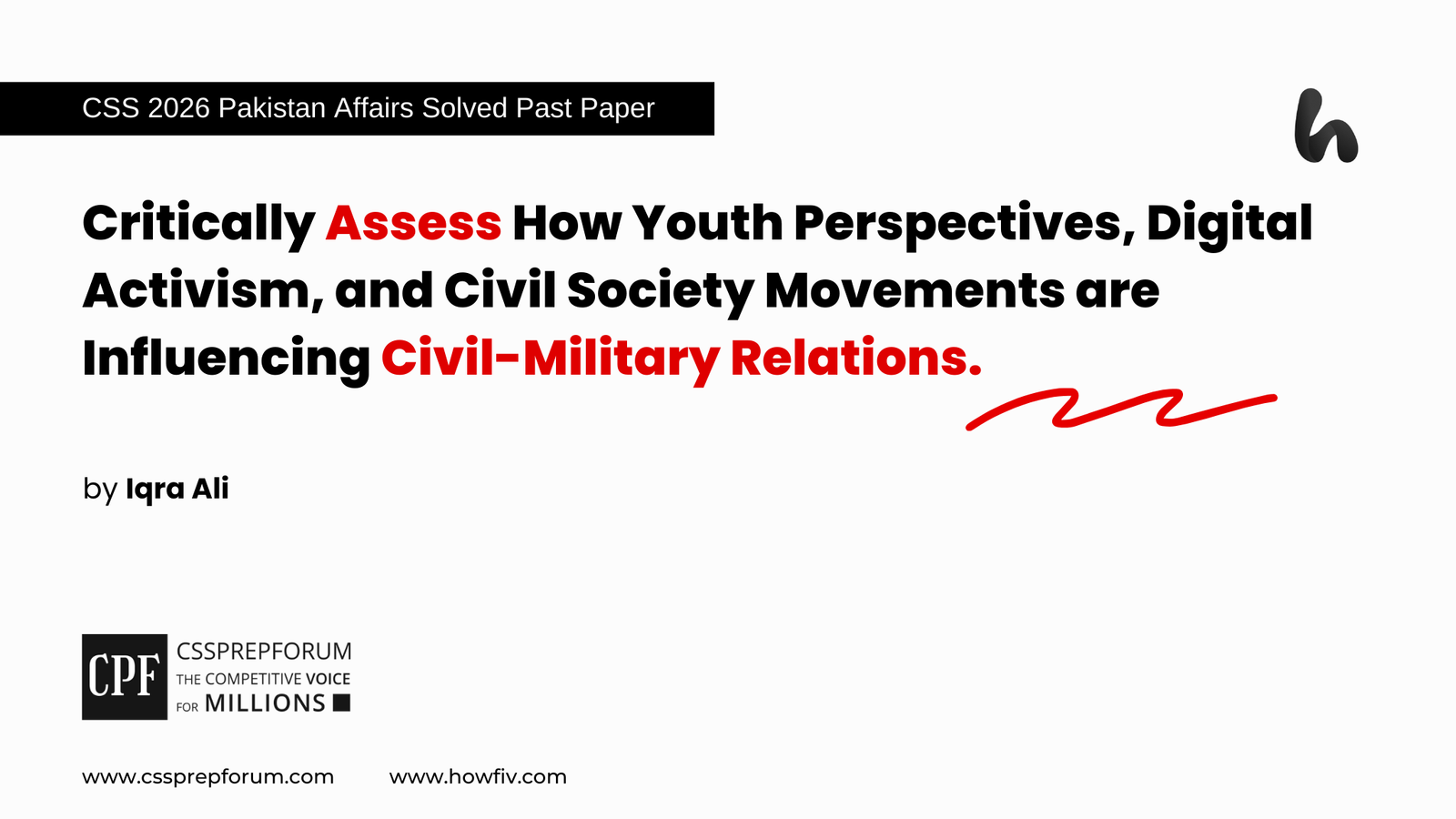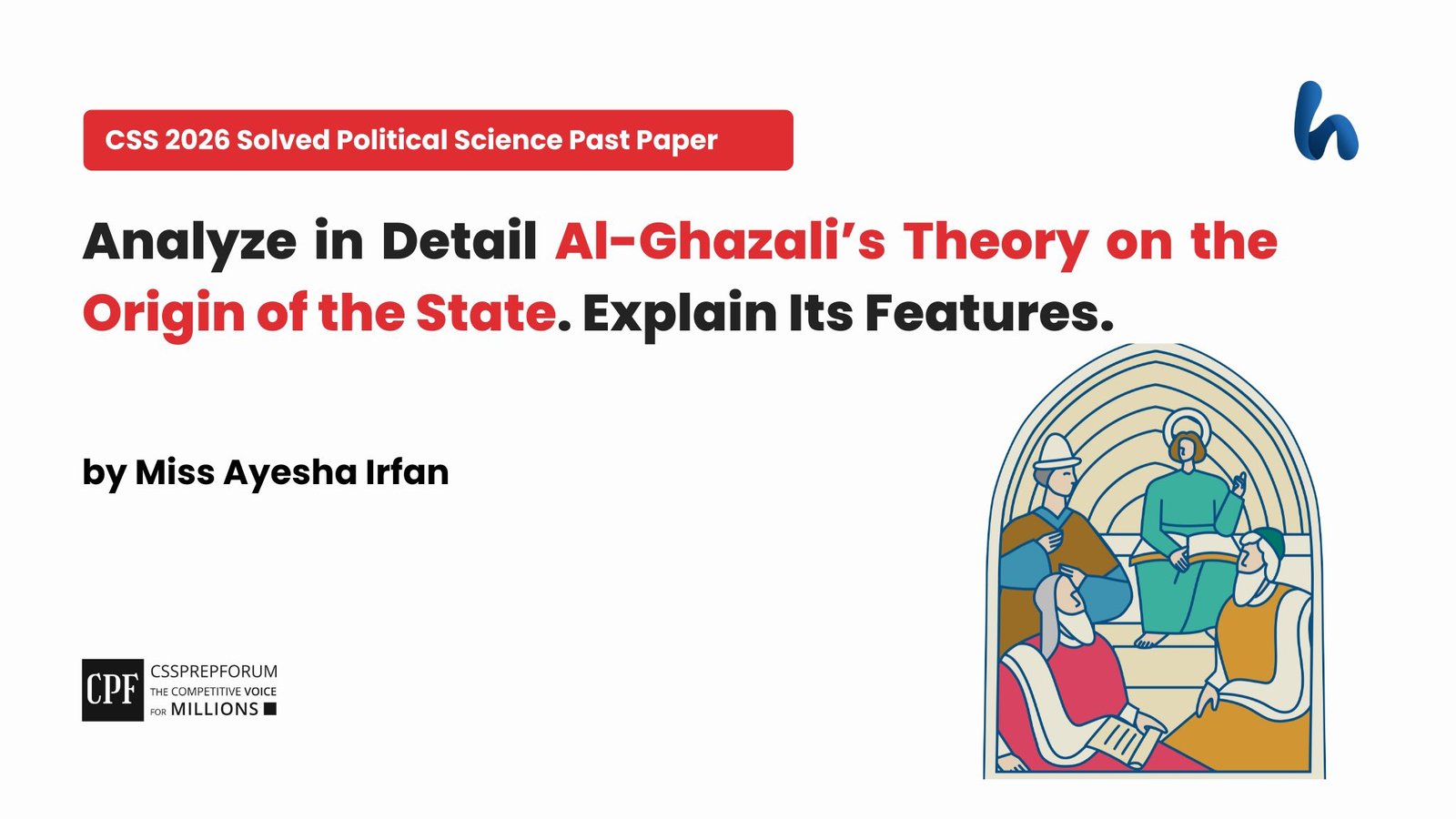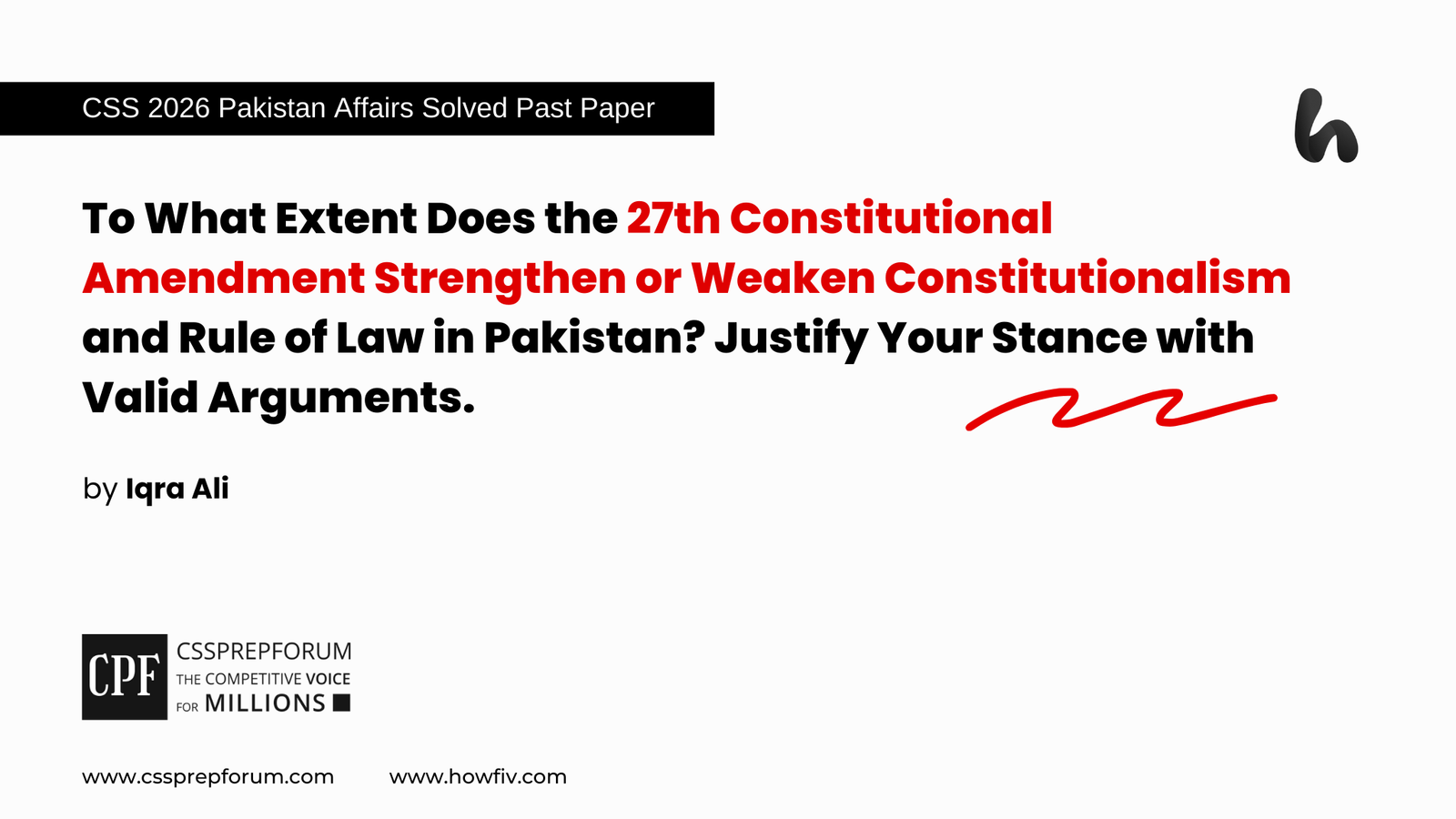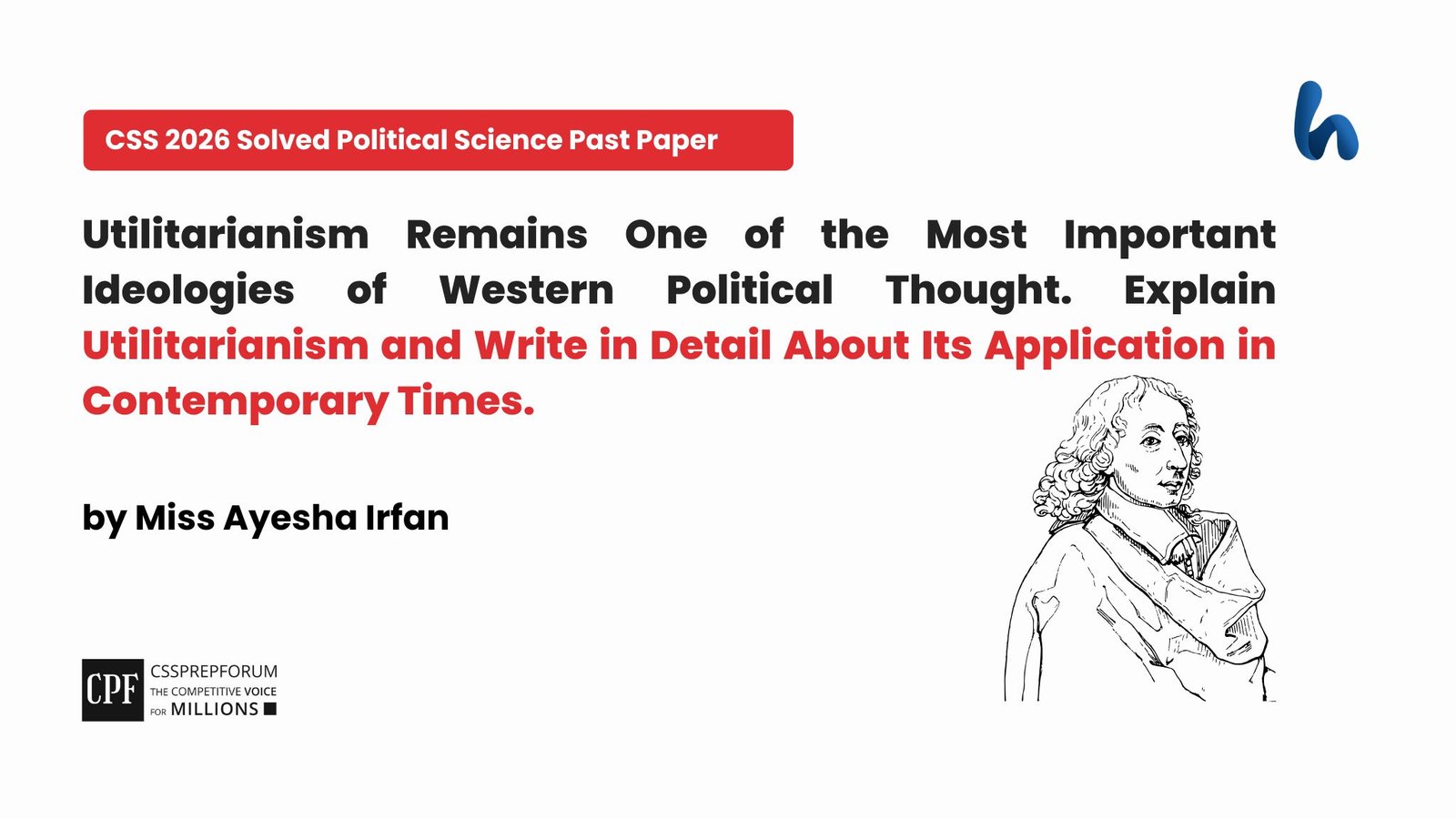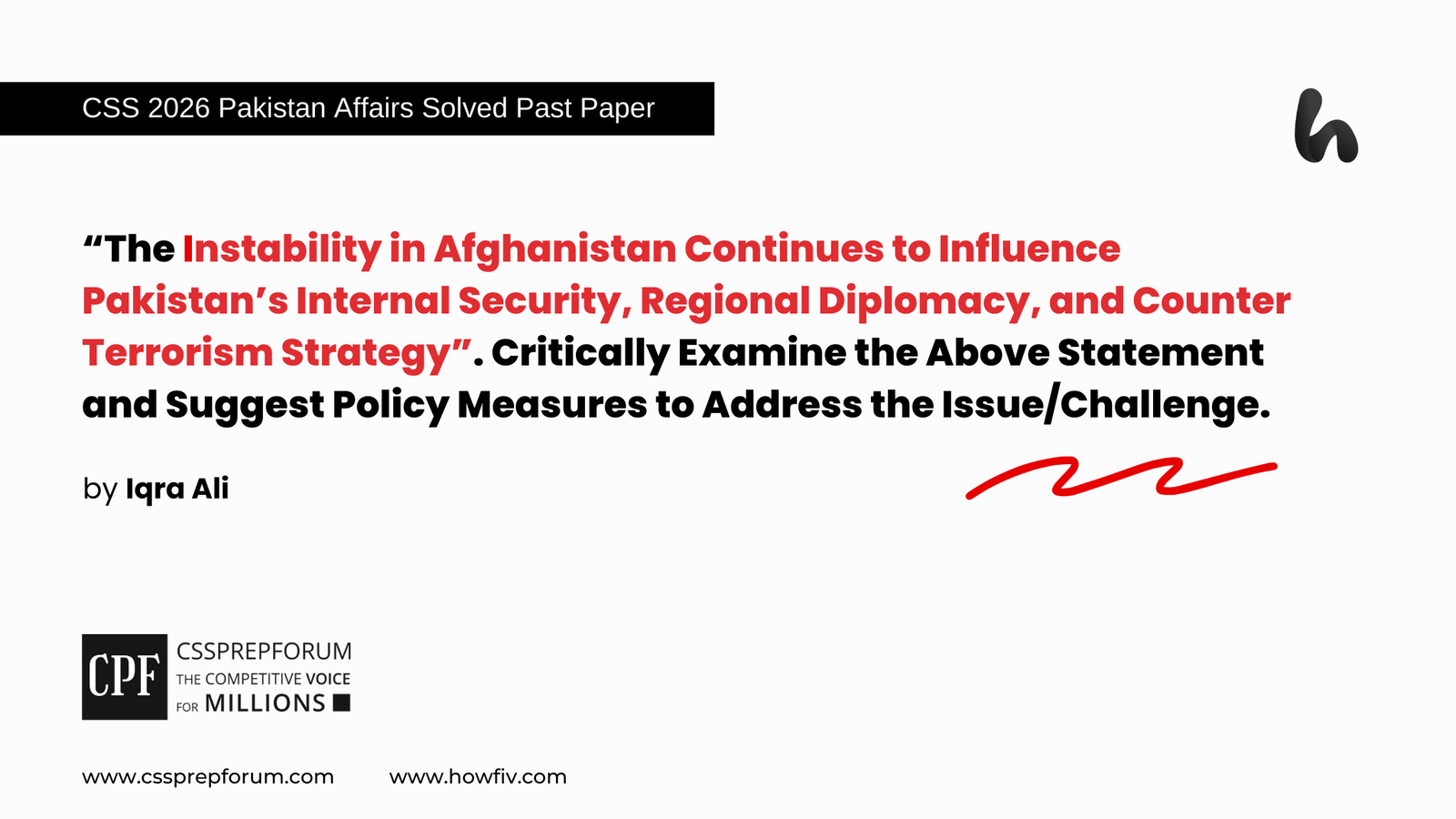CSS Solved International Relations Past Papers | Define the “Balancing Act” in International Relations. What are Pakistan’s imperatives and constraints with regard to maintaining balance in relations with the major powers?
The following question is attempted by Miss Abeera Fatima, the top scorer in CSS IR paper. Moreover, the answer is written on the same pattern, taught by Sir to his students, scoring the highest marks in compulsory subjects for years. This solved past paper question is uploaded to help aspirants understand how to crack a topic or question, how to write relevantly, what coherence is, and how to include and connect ideas, opinions, and suggestions to score the maximum.

Question Breakdown:
The examiner has asked about the Balancing Act in International Relations. First, define the theory of the Balancing Act in International Relations. The second part of the question demands critical thinking on the balancing approach of Pakistan concerning superpowers. So elaborate imperatives for Pakistan to maintain balance in relations with the major powers. In such a manner, you delve into the constraints of Pakistan by maintaining balance concerning the major powers. It is of heed attention that paper II of the International Relations contains pictorial representation and implementation of theories in the practical arena.
Synopsis
1- Introduction
2 -Balancing Act in International Relations
3- A glimpse of imperatives for Pakistan of maintaining balance relations with the major powers
- ✓Relation with the US: Carrot and stick approach
- ✓Relation with China: Strategic partners and blossom friends
- ✓Relation with Russia: An Emerging Entente Cordiale
4- A glance at constraints in the path of Pakistan in maintaining balance among major powers
- ✓Relation with the US: Teeter-totter relationship but not heeded to divorce
- ✓Relation with China: Under dragon’s shadow
- ✓Relation with Russia: Russian boots in warm water
6- Epilogue

Answer to the Question
Introduction
In International Relations, the balancing act is a modern concept and difficult to implement. It is a balanced approach of soft and hard power, in other words- the smart power, from the lens of liberal, neo-liberal, realist, and neo-realist schools of thought. Moreover, the act is classified into the internal and external balancing of the state under the shadow of economic resources and hegemonic presence. The case of Pakistan of marinating the balancing act with superpowers is needed to discuss. Pakistan’s imperatives with the US, China, and Russia are under consideration. Despite imperatives, some constraints regarding the relationship with the US, China, and Russia exit the account.
Balancing Act in International Relations
The balancing act is stemmed from the Balancing of Power, which fascinates a realist think tank for the formation of hegemony in a multistate system through hard power. According to the balance of power theory, states, motivated primarily by their desire for survival and security, will develop and implement military capabilities and hard power mechanisms to constrain powerful and rising states that can prove a potential threat. Balancing is categorized into two forms: internal balancing and external balancing. On one hand, internal balancing enhances a state’s economic resources and military strength to chalk independent and sovereign policy in the international system. On the other hand, external balancing increases the capability of a state’s alliances and interstate collaboration to prevent a hegemon or counter a rising power.
Assumptions of balancing act in the international saga
- ✓ Unbalanced power is aggressive and coercive in nature
Kenneth Waltz believed uni-polarity is the most unstable and the least durable of all international configurations. In the historical context, the expansion of Napoleon’s rule in France and Adolf Hitler in Germany delineated dominance through power; therefore, balancing is a dire need to bring the international distribution of power into balance.
- ✓ Sharp shift from “beggars cannot be choosers” to “absolutely not”
Despite internal and external hard-balancing dilemmas, soft-balancing surfaces as feasible options for secondary powers that attempt to delay, frustrate and undermine strategies of the unipolar leader like the United States. Diplomacy, diplomatic coalitions, international institutions and agreements, and statecraft mechanisms such as territorial denial, as well as economic initiatives and multilateral and regional economic endeavours are some of the tactics being used.
- ✓ State uses the shadow of unilateralism for conventional and non-conventional security
Several aggressive and unilateral US foreign policies: abandonment of the Kyoto Protocol, withdrawal from the Anti-Ballistic Missile Treaty, and war in Iraq in 2003 despite great opposition from other states have led secondary powers to pursue indirect, soft-balancing strategies towards constraining the U.S. power and preventing it from becoming an “unrestricted global hegemon”
- ✓ Fails to stop nuclear proliferation
The Iraq invasion is often used as one of the key incidents that provoked major states to rethink their security and resort to soft balancing against the unipolar since it proved not simply a strategy aimed at stopping the proliferation of nuclear weapons by rogue states but rather a challenge to the norm of territorial integrity – an aggressive U.S. intervention into a region outside of its own that demonstrated the U.S. commitment to taking any necessary actions to ensure that their superiority and primacy is not challenged by anyone.
A Glimpse of Imperatives for Pakistan of Maintaining Balance Relations with the Major Powers
“We need to make the world powers as much a supporter as possible instead of opposing them. In this perspective, the Prime Minister has rightly said that we will not be part of any Cold War between the USA and China, but will try to cease it. The USA needs Pakistan, and Pakistan wants the USA to go ahead and play its role. In this regard, four members of the US Senate Intelligence Committee have visited Pakistan. The purpose of this visit is to improve relations between Pakistan and the USA and to help bring stability to Afghanistan. Pakistan is satisfied that US officials have tried to understand Pakistan’s grievances, but bilateral relations will depend on economic cooperation. It is up to the US government to decide at what level bilateral relations can be restored. However, Pakistan will have to maintain a balance in its relations with the world powers. This is the only way for Pakistan to succeed in that balance.”
-Shahbaz Shareef, Prime Minister of Pakistan
- ✓ Relation with the US: carrot and stick policy
Pakistan signifies diplomatic relations immediately after its red letter day. The US is the largest export market of Pakistan and the largest source of foreign direct investment in the country. The US has supplied 77 million COVID-19 vaccine doses during the pandemic. In addition, the US accommodated almost 800 Pakistanis to the United States every year on a broad range of exchanges to develop and strengthen people-to-people ties. After the 9/11 attack, the relationship between Pakistan and the US has been one of cooperation. On counterterrorism and internal security, Pakistan has taken some action against militant groups and UN-designated terrorist organizations in accordance with its National Action Plan against terrorism. With Pakistan and the United States celebrating 75 years of diplomatic relations this year, the Pakistan-US health dialogue hosted on July 25, 2022, represented an important development in the broadening of bilateral cooperation, 13 with its primary focus on strengthening health sector collaboration. Identifying areas of mutual engagement through the establishment of Pakistani Centres for Disease Control and Prevention (CDC), global health security, childhood immunizations, COVID-19, maternal and child health, and non-communicable diseases need to be quoted in the account. Thus, the strategic imperatives of Pak-US ties could serve the US regional interest and also advantage Pakistan in fulfilling its conventional and non-conventional needs.
“The US-Pakistan relationship is not just a bilateral relationship. In fact, it could even be seen as the story of Pakistan itself.”
- ✓ Relation with China: strategic partners and blossom friends
Pakistan established diplomatic relations by recognizing China among the first countries to advocate sovereignty legitimacy. China has yielded economic, technical, and military assistance to Pakistan; thus, both sides regard each other as close strategic allies. According to Stockholm International Peace Research Institute, Pakistan is China’s biggest arms buyer, counting for nearly 47% of Chinese arms exports. China is the largest investor in Pakistan’s Gwadar Deep Sea Port, which is strategically located at the mouth of the Strait of Hormuz. It is viewed warily by both the U.S. and India as a possible launchpad for the Chinese Navy, giving them the ability to launch submarines and warships in the Indian Ocean. China has recently pledged to invest nearly 43 billion US dollars. Pakistan and China also conducted a joint maritime exercise dubbed “Sea Guardian 2” in July 2022. Pakistan has been one of China’s major trade partners. According to China’s customs statistics, the bilateral trade volume for the calendar year 2017 crossed the US$20 billion mark for the first time. In 2017 China’s exports to Pakistan grew by 5.9% to reach $18.25 billion, whereas Pakistan’s exports to China fell by 4.1% to $1.83 billion.
Pakistan’s friendship with Beijing, which it defines as “deeper than the oceans, higher than the mountains, and sweeter than honey.”
- ✓ Relation with Russia: An Emerging Concord
Nascent Russia–Pakistan relations are emerging under the change in geostrategic and geopolitical policies in South Asia. Since 2010, the relationship has improved through high-level visits, arms sales, and increased cooperation. In August 2017, Pakistan received four more Mi-35M Hind-E helicopters. Following these procurements, Russia and Pakistan began a series of joint military exercises, such as the Arabian Monsoon naval drills in 2014 and 2015. In 2017, the Pakistan Navy spearheaded the Aman naval exercise, which included the participation of 35 countries. There are six major areas where broad convergence between Russian and Pakistani policy interests might have some potential: the future of Afghanistan; strategic balance in South Asia; nuclear doctrinal similarities; integration of conventional and nuclear deterrence; changing character of war—hybrid war and its counter; and Pakistan’s quest for NSG membership along with its energy needs. The number of Pakistani nationals in Russia is approximately 1200. Among them, there are students, businessmen, professionals, and blue-collar workers.
“Russia attaches particular importance to cooperation with Pakistan in the framework of the Shanghai Cooperation Organisation. Russia is providing extensive support to Islamabad in turning its observer status to a full-fledged membership.”
-Alexey Dedov, Ambassador Extraordinary and Plenipotentiary of the Russian Federation
A Glance at constraints in the path of Pakistan in maintaining balance among Major Powers
- ✓ Relation with the US: teeter-totter relationship but not heeded to divorce
The very first constraint lies under the ongoing US-China rivalry; consequently, the potential for impacting Pakistan’s relationship with both parties is at risk. Historically, Pakistan has maintained robust relationships with both the U.S. and China based on security, political, and economic interests. Current pillars of Pakistan’s relationship with the U.S. include Pakistan’s ongoing cooperation in Afghanistan, which will be required well past the U.S. military drawdown. While military and economic aid has decreased, America remains the largest export market for Pakistani goods and a choice education destination for the Pakistani elite. Conversely, China has become Pakistan’s largest supplier of arms, and it has initiated unprecedented economic cooperation via CPEC, with a projected value of $62 billion. Pakistani strategists also count on China for consistent support to contend with asymmetrical rival India and moral support in helping internationalize the issue of Kashmir—assistance the U.S. does not provide. At the same time, Pakistan remains a key player in American efforts in Afghanistan. The two countries are trying to build a strategic partnership, but there remains a significant trust deficit, which continues to hinder successful cooperation in combating common threats.
“We have been paying Pakistan billions of dollars and at the same time they have been housing the very terrorists we are fighting.”
-Former US President, Donald Trump
- ✓ Relation with China: under dragon’s shadow
All-weather partnership has its limitation of strategic warfare tool for geopolitical bargains. Despite political stability in Pakistan as a prerequisite for economic development, the current scenario reveals no green signal from blossom friend to enact policy for fruitful results. Moreover, accelerating decision-making and honoring contracts under the CPEC projects Pakistan is failed to deliver economic stability which gives birth to enormous questions. Next to it, China has claimed to chalk the model of governance through high-level military and civilian leadership to get out from the West loans but has failed to safeguard in the regime change operation. In the same way, the rights of the people of Gawadar are reserved in regard: the fishing rights, the share of employment, and the local small enterprises business.
- ✓ Relation with Russia: Russian boots in warm water
Some constraints prevail in a nascent relationship: Pakistan’s policy of using jihadi elements as a proxy; the fate of Kashmir; Russia’s preferred defense relations with India; Pakistan’s preferred strategic reliance on China; and Pakistan’s continued dependence on the United States need to be cited in the account. On the other hand, Pakistan’s constraints of Russian boots in warm water demand a peaceful and collaborative approach in the region.
Epilogue
To sum up, the balancing act is famously used by global stakeholders in the contemporary world; therefore, a nexus of soft and hard power encompasses the approach. A state formulated internal and external balancing keeping in mind national integrity, sovereignty, and national interest. The same case goes for Pakistan; a balanced approach is seen in foreign policy. However, Pakistan’s imperatives in maintaining a balanced approach among superpowers, the US, China, and Russia, have surfaced. Nevertheless, some constraints revolved around speculations despite imperatives for Pakistan.
“The world has changed a lot and most countries will make their choices based on their geopolitical and economic interests. It is not so easy anymore for major powers to make others compliant to their wishes.”
-Talat Masood
CSS Solved Past Papers’ Essays
Looking for the last ten years of CSS and PMS Solved Essays and want to know how Sir Kazim’s students write and score the highest marks in the essays’ papers? Then, click on the CSS Solved Essays to start reading them.
CSS Solved Essays

CSS Solved General Science & Ability Past Papers
Want to read the last ten years’ General Science & Ability Solved Past Papers to learn how to attempt them and to score high? Let’s click on the link below to read them all freely. All past papers have been solved by Miss Iqra Ali & Dr Nishat Baloch, Pakistan’s top CSS GSA coach having the highest score of their students.
General Science & Ability Solved Past Papers
CSS Solved Pakistan Affairs Past Papers
Want to read CSS Pakistan Affairs Solved Past Papers and learn how to attempt them to score high? Let’s click on the link below to read them all freely. All past papers’ questions have been attempted by Sir Kazim’s students, who scored the highest in the subject.
CSS Solved Pakistan Affairs
CSS Solved International Relations’ Past Papers
Have you opted for International Relations in the CSS examination and want to score above 150? Then, click on the CSS Solved International Relations’ Past Papers by Miss Abeera Fatima, the top IR scorer and the best IR coach in Pakistan.
CSS Solved International Relations Past Papers
Articles Might Interest You!
The following are some of the most important articles for CSS and PMS aspirants. Click on any to start reading.


